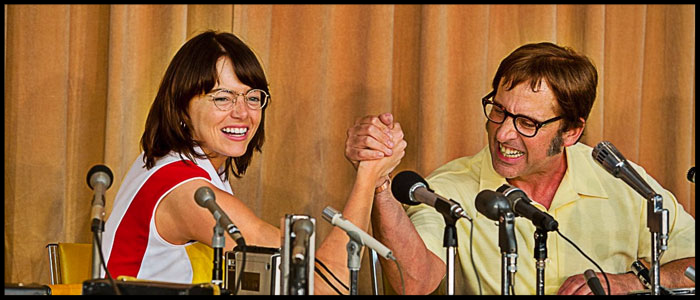
½*/****
starring Emma Stone, Steve Carell, Andrea Riseborough, Sarah Silverman
written by Simon Beaufoy
directed by Valerie Faris & Jonathan Dayton
by Walter Chaw A movie that will make no one uncomfortable while reassuring the most blinkered that they’ve given at the office, Battle of the Sexes could be directed by anyone, star anyone, and it would still be exactly the same edgeless, meaningless, obsequious, instantly-obsolete artifact, desperate to be loved, expecting to be feted come awards season. It’s the casserole recipe that won in 1950, and Emma Stone continues her terrifying run as Audrey Hepburn’s career by ticking off her Children’s Hour/LGBTQ-sensitivity check-box. Stone’s blank, not “effortless” but rather “not trying” and “under-written” performance, is essentially a black wig, glasses, and a half-open pucker. Her Billie Jean King is a cipher who mouths platitudes about “equality” when what she really means is that she’s a vacuous narcissist who steamrolls everyone trying to help her in a movie that is, in fact, as woman-hating as the men it sets up as straw…well, men. To be clear, Billie Jean King beating Bobby Riggs in an exhibition match does not mean that women and men are “equal.” It doesn’t mean they’re unequal, either. It actually means nothing. Indeed, that King, at the age of 29, in peak condition and at the pinnacle of her profession and training hard, beat a 55-year-old former world champion whom the film takes pains to reassure is not only not training, but also drinking and womanizing and popping mysterious pills while doing a full-blitz promotional campaign (he played the entire first set in a branded windbreaker), says the opposite, I think, of the intended message. Understand that at this point in the sport, in 2017, it’s not controversial that women and men do not compete at the same level. You’re getting mad, I can tell. This is Serena Williams, the undisputedly greatest woman tennis player in the history of the sport, in 2013 on “Late Night with David Letterman”:
